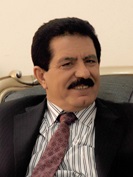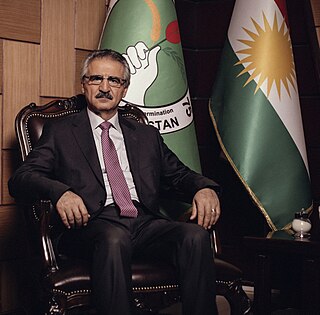
The Peshmerga is the Kurdish military forces of the autonomous Kurdistan Region of Iraq. According to the Constitution of Iraq, the Peshmerga, along with their security subsidiaries, are responsible for the security of Kurdistan Region, due to the fact that the Iraqi Armed Forces are forbidden by Iraqi law to enter Iraqi Kurdistan. These subsidiaries include Asayish, Parastin u Zanyarî and the Zeravani (Gendarmerie). The history of Peshmerga dates back to 18th century, starting out as a strictly tribal pseudo-military border guard under the Ottomans and Safavids and later changing to a well-trained, disciplined guerrilla force in the 19th century.

Kurdistan Socialist Democratic Party is a political party in Kurdistan Region. The first leader was Saleh Yousefi after 1981. After 1992, the party was led by Mahmoud Othman. The party is currently led by Mohammed Haji Mahmoud. It is a splinter of the Kurdistan Democratic Party.

Kurdistan Region, abbr. KRI, is an autonomous region in Iraq comprising the four Kurdish-majority governorates of Erbil, Sulaymaniyah, Duhok, and Halabja, and bordering Iran, Syria, and Turkey. The Kurdistan Region encompasses most of Iraqi Kurdistan but excludes the disputed territories of Northern Iraq, contested between the Kurdistan Regional Government and the central Iraqi government in Baghdad since 1992 when autonomy was realized. The Kurdistan Region Parliament is situated in Erbil, but the constitution of the Kurdistan Region declares the disputed city of Kirkuk to be the capital of the Kurdistan Region. When the Iraqi Army withdrew from most of the disputed areas in mid-2014 following the Islamic State’s invasion of Iraq, Kurdish Forces entered the areas and held control there until Iraq retook the areas in October 2017.

The Kurdistan Free Life Party, or PJAK, is a Kurdish leftist anti-Islamic Republic of Iran armed militant group. It has waged an intermittent armed struggle since 2004 against the Iranian regime, seeking self-determination through some degree of autonomy for Kurds in Iran.

Masoud Barzani is a Kurdish politician who has been leader of the Kurdistan Democratic Party (KDP) since 1979, and was President of the Kurdistan Region of Iraq from 2005 to 2017.

The Iran–PJAK conflict is an armed conflict between the Islamic Republic of Iran and Kurdish rebels of the Kurdistan Free Life Party (PJAK), which began in 2004. The group has carried out numerous attacks in the Kurdistan Province of Iran and provinces of Western Iran. PJAK is closely affiliated with the militant Kurdistan Workers' Party (PKK), the primary opponent of the Republic of Turkey in the Kurdish–Turkish conflict. PJAK has been designated as a terrorist organization by Iran, Japan, Turkey, and the United States.

The Gorran Movement or just Gorran (Change) is a Kurdish political party in the Kurdistan Region of Iraq. Formerly under the leadership of Omar Said Ali, it was founded in 2009 by Nawshirwan Mustafa. Gorran is the sixth largest party in the Kurdistan Region, having lost almost all of its voters (95%) since its foundation, and is now no longer represented in the Iraqi parliament, Nawshirwan Mustafa's sons Chya and Nma were the main cause of the Gorran Movements political and electoral obliteration.

Kosrat Rasul Ali is a Kurdish politician and the leader of the Supreme Political Council of Patriotic Union of Kurdistan (PUK), veteran Peshmerga military leader, former Prime Minister, and former Vice President of the Kurdistan Region.

Hikmat Muhammad Karim, known as Mala Bakhtiyar or Mala Bakhtiar, is a political leader and a Senior Iraqi Kurdish politician. He is a commander and General of the Kurdish PUK Peshmerga forces and is considered one of the most powerful people in iraq. Mala Bakhtiar is the former chief of the executive bureau of the patriotic union of Kurdistan. He is now the Joint leader of the Supreme political council of the Patriotic Union of Kurdistan (PUK), alongside Kosrat Rasul Ali. Mala Bakhtiar was awarded a medal for being the best national and intellectual figure of the middle east by the International Union of Economists and Managers in the European Union and was recognized as an international democratic figure in 2014. His power is on the rise after the PUK held its 4th congress on the 19th of December 2019, during which he was elected into the Supreme Political Council of the PUK. In November 2021, it was reported that he was being treated after being poisoned. On the 13th of November 2021, after receiving treatment in Berlin, Germany, he returned to Sulaimaniyah, Kurdistan, where he received a Hero’s welcome.

The Iraqi–Kurdish conflict consists of a series of wars and rebellions by the Kurds against the central authority of Iraq during the 20th century, which began shortly after the defeat of the Ottoman Empire in World War I and lasting until the U.S. invasion of Iraq in 2003. Some put the marking point of the conflict beginning to the attempt by Mahmud Barzanji to establish an independent Kingdom of Kurdistan, while others relate to the conflict as only the post-1961 insurrection by the Barzanis. The conflict lasted until the U.S. invasion of Iraq in 2003, though tensions between the Kurdish autonomy and the central Iraqi government have continued.

The Democratic Union Party is a Kurdish left-wing political party established on 20 September 2003 in northern Syria. It is a founding member of the National Coordination Body for Democratic Change. It is the leading political party among Syrian Kurds. The PYD was established as a Syrian branch of the Kurdistan Workers Party (PKK) in 2003, and both organizations are still closely affiliated through the Kurdistan Communities Union (KCK).

Salih Muslim Muhammad is the co-chairman of the Democratic Union Party (PYD), the main party of the Autonomous Administration of North and East Syria. As the deputy coordinator of the National Coordination Committee for Democratic Change, he is the most prominent Kurdish representative for much of the Syrian civil war.

An independence referendum for the Kurdistan Region of Iraq was held on 25 September 2017, with preliminary results showing approximately 92.73 percent of votes cast in favour of independence. Despite reporting that the independence referendum would be non-binding, the autonomous Kurdistan Regional Government (KRG) characterised it as binding, although they claimed that an affirmative result would trigger the start of state building and negotiations with Iraq rather than an immediate declaration of independence of Kurdistan. The referendum's legality was rejected by the federal government of Iraq.

Kurds in the Netherlands may refer to people born in or residing in the Netherlands of Kurdish origin.

The Battle of Kirkuk was a battle in the city of Kirkuk in northern Iraq between Iraqi Kurdistan and the Islamic State of Iraq and the Levant. On the night of January 29, around 150 ISIL fighters attacked positions south and west of the city of Kirkuk, Iraq, which were temporarily under the control of the Peshmerga. The ISIL offensive began under the cover of dense fog and succeeded in overwhelming Peshmerga positions and seizing the towns of Mala Abdullah, Maryam Beg, Tel Ward and the Maktab Khalid crossing. Parts of the Khabbaz oil fields were also captured, taking 24 workers hostage. At least 25 Peshmerga fighters died including Brig. Gen. Sherko Shwani, commander of the 1st Brigade and the highest ranking head of Peshmerga forces in Kirkuk. Gen. Sherko Shwani was killed after being trapped and shot by attackers, according to another Peshmerga commander. Around 16 other Peshmerga fighters were captured by ISIL, and later killed in a staged execution.

Parliamentary elections took place in Kurdistan Region on 30 September 2018 to elect Parliament. The ruling Kurdistan Democratic Party (KDP) came first in a parliamentary election in the Kurdistan Region of Iraq, winning 45 seats, that positioning it to lead the next regional government. A year after a failed bid for independence, Iraq's Kurds voted last month in a parliamentary election. Announcement of the results was delayed for three weeks. The KDP's historic rival and junior coalition partner in government, the Patriotic Union of Kurdistan (PUK), was in second place with 21 seats. The results suggest that Masoud Barzani’s KDP will take a dominant position in Kurdish politics.

Lahur Talabany, born 1975, also known as Lahur Sheikh Jangi Talabany is the Co-President of the (PUK) and the former Director of the Zanyari Agency, and Former Director of the Counter Terrorism Group (CTG). Known commonly as Sheikh Lahur, Talabany was a leading figure in the fight against terror especially in the fight against ISIS.

Hungary–Kurdistan Region relations are bilateral relations between Hungary and the Kurdistan Region. Hungary is represented in Kurdistan Region through a consulate general since November 2014, while Kurdistan Region has no representation in Hungary. Relations are characterized by several high-level talks and close ties. The Kurdish President Massoud Barzani visited Hungary in 2012 and in 2015 on official visits. Moreover, Hungarian Prime Minister Viktor Orbán uttered support for the independence of Kurdistan Region from Iraq in 2015 causing concern among the Islamic Supreme Council of Iraq.

Czech Republic–Kurdistan Region relations are bilateral relations between the Czech Republic and the Kurdistan Region. The Czech Republic is represented in the Kurdistan Region through a consulate general in Erbil since 2006, while the Kurdistan region has no representation in the Czech Republic. Relations between the two are characterized by high level talks and cooperation against ISIS. Kurdish President Massoud Barzani visited the Czech Republic in 2015, meeting President Miloš Zeman and other senior government officials. In November 2015, Czech President Miloš Zeman said that he believes the Kurdistan Region will soon become independent.
Kurdish-Islamic synthesis, or Kurdish-Islamic nationalism is a form of Kurdish nationalism which is Islamist in nature, unlike mainstream Kurdish nationalism, which is secularist in nature.


















